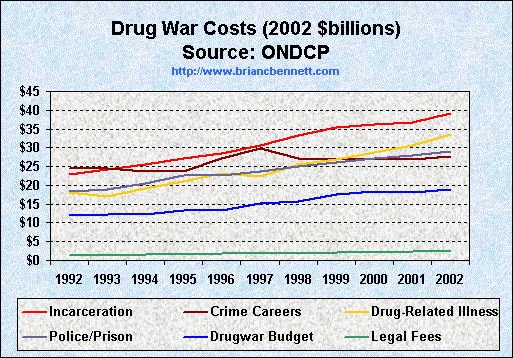Drug War Cost Breakdown
(2005 Update)
| When allocating the overall costs to either a cost of drug use or a cost of drug war, the primary consideration was: is this a cost that would exist if the drugs were legal? If so, it was allocated as a cost of drug use, otherwise, it is allocated as a cost of drug war as explained below. |

| Categorizations and Values for Drug War Costs (2002 $billions) | |||||||||||
|---|---|---|---|---|---|---|---|---|---|---|---|
| Category | 1992 | 1993 | 1994 | 1995 | 1996 | 1997 | 1998 | 1999 | 2000 | 2001 | 2002 |
| Lost Wages Due to Incarceration | $22.961 | $24.110 | $25.607 | $27.130 | $28.473 | $30.511 | $33.257 | $35.399 | $36.244 | $36.869 | $39.095 |
| Crime Careers | $24.617 | $24.595 | $23.796 | $23.812 | $27.241 | $29.824 | $27.180 | $26.952 | $26.836 | $26.957 | $27.576 |
| Drug Abuse Related Illness | $18.214 | $17.138 | $19.234 | $20.938 | $23.241 | $22.323 | $25.542 | $26.995 | $28.654 | $30.681 | $33.452 |
| Police/Prison | $18.470 | $18.857 | $20.371 | $22.508 | $22.763 | $23.590 | $24.922 | $26.146 | $27.036 | $28.067 | $29.051 |
| Federal Drug War Budget | $11.90 | $12.20 | $12.20 | $13.30 | $13.40 | $15.20 | $15.80 | $17.70 | $18.50 | $18.10 | $18.80 |
| Private Legal Defense | $0.468 | $0.483 | $0.521 | $0.528 | $0.510 | $0.585 | $0.605 | $0.555 | $0.596 | $0.643 | $0.647 |
| Grand Totals | $96.63 | $97.38 | $101.73 | $108.22 | $115.63 | $122.03 | $127.31 | $133.75 | $137.87 | $141.32 | $148.62 |
Sources: The Economic Costs of Drug Abuse in the United States,
Office of National Drug Control Policy (Dec 2004)
National Drug Control Strategy (2002)